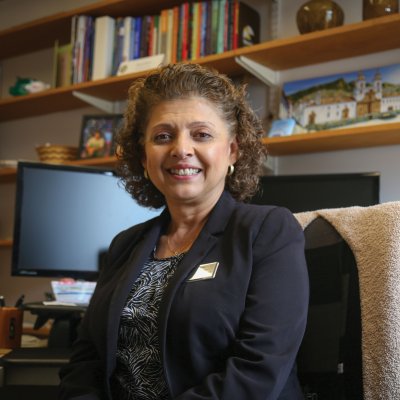A Q&A with Rocio Diaz ’14, director for community engagement & adult outreach

We talked to Rocio Diaz ’14, director for community engagement & adult outreach, about Goshen’s journey amidst changing demographics, perspectives regarding Hispanic/Latinx education and where Goshen can go from here. Rocio has been a Goshen College parent of two graduates, an employee working in intercultural education (initially hired as the administrative assistant for the Center for Intercultural Teaching and Learning) and then a student/alumna herself. This interview has been edited for clarity and length.
Q: How did you and your family end up at Goshen?
A: My neighbor was working at Goshen College, and convinced us to visit when my daughter was ready for college in 2006. We thought ‘let’s just go and see how they can help us.’ We liked the convenience of my daughter staying home and not having to drive too far to attend college, so we enrolled her at GC.
Q: How did the Center for Intercultural Teaching and Learning support Latino students?
A: We saw all the ways that [Latino students] needed support because of all the issues that they face when they’re here. They still have to work sometimes full-time jobs or help with siblings at home, or translate for their parents. And often their families don’t understand how much work college is.
Q: In order to be eligible for HSI status, undergraduate enrollment must be at least 25% Hispanic students, along with several other criteria. What do you think about Goshen becoming a Hispanic Serving Institution?
A: Well, we’re in the middle of a Latino community, Latino students are all around us, and I think that we are already serving those students and helping them achieve and accomplish their education goals. So it makes sense.
Q: How else were you reaching the Latino community?
A: If you want to reach the Latino community or bring students, you have to think about the whole family and not just that one student that you want here. The focus was more on Latino families and not just juniors and seniors because we’re changing the mindset of the parents, so the parents start imagining their kids getting education.
Q: How have you seen the Latino student experience here at Goshen evolve since you started?
A: I’ve seen a higher number of students participating in different clubs and different organizations, and I think it was mostly because of the academic support and also the mental and social support students received. We still try to connect with the students and encourage them so they feel more empowered.




